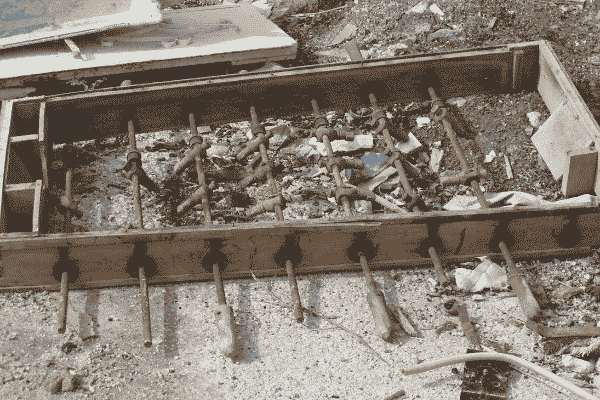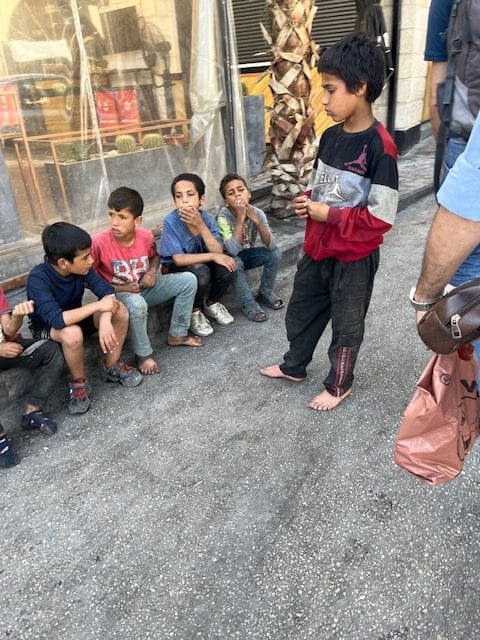Eleven years after the break of the bloody civil war, 6 Syrians out of 10 suffer from hunger and have no idea where and how to get food.
According to the Global Report on Food Crisis, there are more than 12 million people who are living a situation of food insecurity in Syria. FAO defines food insecurity as the lack of regular access to enough safe and nutritious food for normal growth and development and an active and healthy life.
At the expenses of the youngest
The reality that has been repeated daily over the past few years in Syria is spine-chilling.
In the surroundings of Damascus, men and women wait in line for hours for their turn to receive a few loaves of bread or a handful of rice. Many children search through the rubbish for something edible. Unfortunately, as for every war and crisis, children are the ones who pay the highest price. When debts become unsustainable, child labour and early marriage remain the last desperate resource for thousands of families who would otherwise starve to death.
According to a study dated March 15, 2022,in Syria child labour is 84% widespread and early marriage 71%. But it is mainly Syrian refugee children who experience the tragic situation. In Jordan, for example, more than 40% of Syrian refugees do not attend school in order to help family’s sustenance. And although the minimum age for marriage in Jordan is 18, some 36% of Syrian girls marry before reaching adulthood.
It is sad to think that before the civil war, Syria was a country with a literacy rate close to 100%. Schools and canteens used to be filled with children.

A general food insecurity
Food prices have doubled (and in some cases they tripled) from 2021 and the war in Ukraine Is already feeling its effects in the region. As a matter of fact, the Syrian Republic has always relied on the essential wheat importation coming from Russia. But the crisis in Ukraine has stopped wheat and fuel importation. The government of the dictator Assad is rationing flour, fuel and sugar in this moment. A rice crisis is feared.
To all of this it should be added a dizzying Syrian pound devaluationwhose immediate consequence is a very high inflation and a growing impossibility for Syrians to buy the bare essentials for survival.
Today the minimum monthly salary is 26$ in the public sector. At the market you can find an egg for 15 cents, one kilo of meat for 4$ and one kilo of rice for half a dollar. The maths are soon done: with such a salary, a family with two children can buy food for a maximum of four days a month. It is not surprising that 90% of the population live below poverty line.
Not for over a decade have so many Syrians been at risk of food insecurity. This year it is expected that more than 12 million people are at risk of suffering from hunger. Not only food and fuel, but also water and electricity.
So, the expulsion of Isis from Syria was not enough to solve the inhabitants’ despair. Nor is it enough that 80% of Syrian territory is back under the control of Bashar-al-Assad’s government.
The consequences of eleven years of war and international sanctions are extremely bitter. A war that is still being fought, especially in the north of the country.

The response of Pro Terra Sancta to the food crisis in Syria
Pro Terra Sancta has been existing in Syria since 2014 with the opening of the first emergency centres in Damascus, Aleppo, Latakia, Knayeh and Yacoubieh. Emergency projects include the distribution of essential goods, sanitary assistance, education in schools and in kindergartens and psychological support.
Recentemente l’Associazione ha voluto far fronte alla quasi totale mancanza di elettricità sostenendo l’acquisto e l’implementazione di pannelli solari per fornire costantemente e gratuitamente energia elettrica e acqua calda. Ricordiamo che in Siria il governo permette un massimo di 3 ore di elettricità al giorno. In a Syria that is dying of hunger, even the smallest help is fundamental to keep our presence by their side.
A heartfelt thanks!
ww.proterrasancta.org






